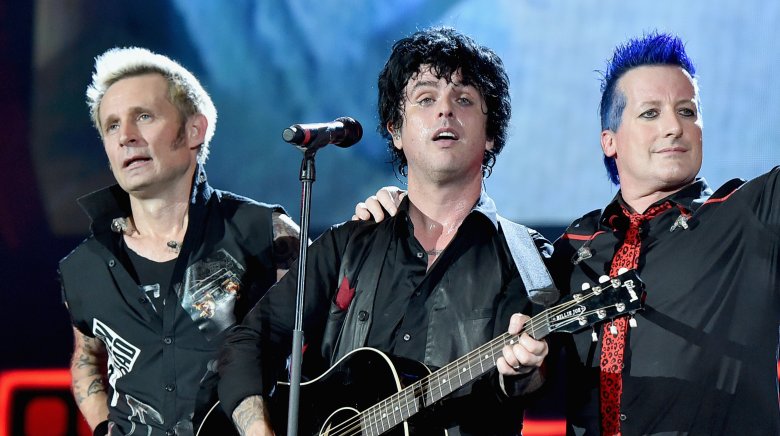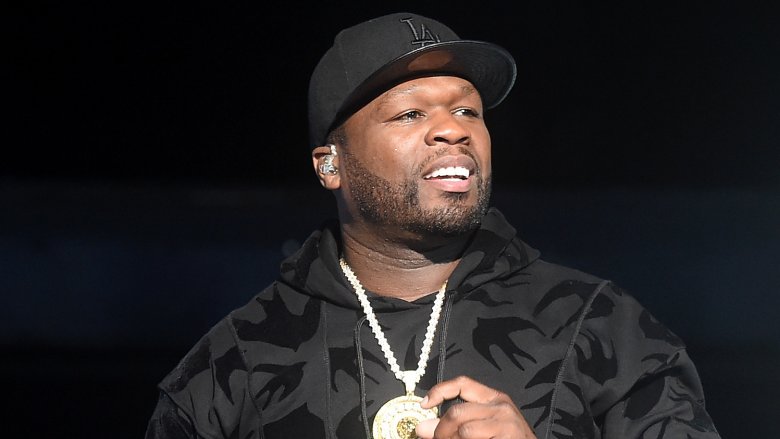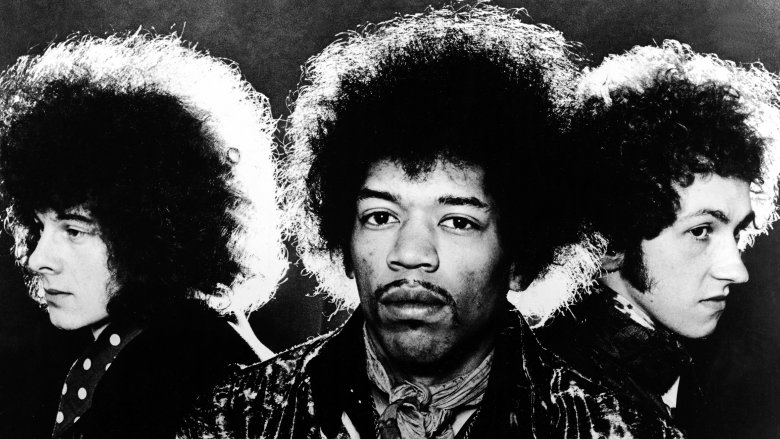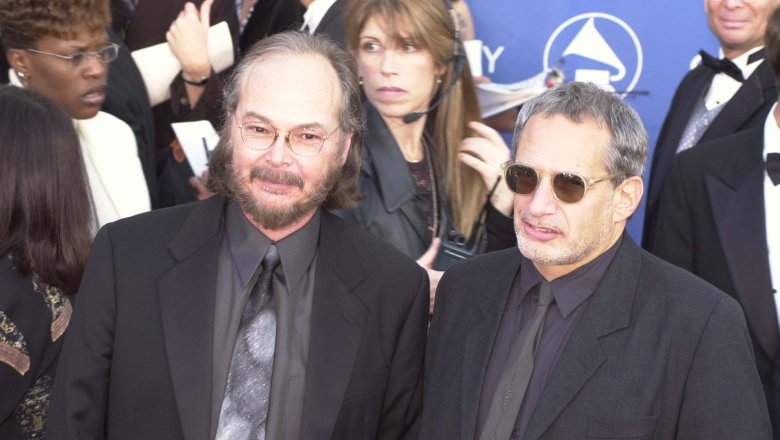Albums Canceled Because Of An Idiot Mistake
Singers, songwriters, and bands obviously do everything they can to make the best songs and albums possible. But in order for that music to get to the fans, it usually has to proceed through the proper channels via the artist's record label. If it passes all of the corporate side's numerous requirements and qualifications, it gets pressed into vinyl or shiny disc (or sent to iTunes and Spotify), and then purchased by millions and unconditionally loved forever.
Honestly, musicians are lucky if they get that far. A lot can go wrong during the conception and production of an album. Maybe the label executives don't think the record is marketable enough, or maybe the whole thing was poorly recorded. It's not unheard of for a record label to go out of business, either. Once in a while, bands somehow misplace or erase their own work. For all those reasons and more, music gets "shelved," meaning that the master tapes (if they're still extant) get tossed in a vault and never do reach receptive ears. Here are some of those records, and the annoying reasons why you'll probably never hear them.
What kind of American Idiot steals the master tapes?
After Warning brought Green Day its worst sales figures to date for a major label release, the group that made punk widely palatable reconvened in 2003 to record its seventh studio album, Cigarettes and Valentines. Turns out, seven was not a lucky number for the trio, who were nearly finished recording when the masters were stolen right out of the studio. The band decided to let the missing album die, and move forward with something new (which is very punk). That's when they wrote and recorded the 2004's American Idiot, a politically potent concept album that went on to become a Broadway musical (which is decidedly less punk).
Some unfinished rough cuts of Cigarettes and Valentines were salvaged, reworked, and released here and there. The title track appears on the Green Day live record Awesome as F***, for example. The rest remain in the Green Day "vault," and probably will for a while. "There's always a lot in the vault, but we tend to look forward rather than reaching back," bassist Mike Dirnt told NME.
Britney Spears lost her Doll
It's not entirely clear if Britney Spears ever actually finished making an album in the early aughts called Original Doll. After all, she was very busy at the time, doing stuff like hanging out with Austin Powers, filming Crossroads, and falling in love with that Kevin Federline guy. But if Original Doll does exist (or did), Spears' unauthorized method of prematurely promoting it is probably what prevented the album from hitting fans' iPod Nanos.
In December 2004, Spears showed up unannounced at the studios of major Los Angeles-area pop radio station KISS-FM. The reason for her visit: to premiere "Mona Lisa," her new single from a forthcoming album. "Good luck with your album. It's untitled," disc jockey Jess Lozano said after playing the song. "It's probably going to be called Original Doll," Spears corrected, adding that it was "halfway done" and would be out by mid-2005. Spears' label, Jive, apparently had no idea what their star was talking about. After the "Mona Lisa" incident, a Jive spokesperson said that "no album is scheduled at the moment" and that the label didn't plan on releasing "Mona Lisa" as a radio single, but did confirm that "Britney is in the studio working on some material." The record never surfaced.
Columbia thought people wouldn't like 50 Cent if he had a sketchy past
Some executive at Columbia Records apparently had no idea how rap works. Or that "street cred" is very important for artists and their fans. Or how having a unique and harrowing story to tell is what makes a rapper and their music interesting. Nor did this record label mucky-muck notice that harder-edged rappers in the late '80s and early '90s, like N.W.A., Snoop Dogg, and 2Pac, moved millions of units by setting their straight-outta-real-life stories to sick beats and memorable hooks. Some executive (or executives) at Columbia Records thought that 50 Cent getting shot nine times — and surviving — would somehow put people off of his music.
50 Cent's major-label debut was the monster hit Get Rich or Die Tryin', which gave the world classics like "In da Club" and "21 Questions," and gave 50 Cent millions of dollars. But Fiddy's first big album was supposed to be a record called Power of the Dollar. Then the guy otherwise known as Curtis Jackson got shot on the street in front of his grandmother's house one afternoon in May 2000. He famously took nine bullets and lived. Columbia Records subsequently got cold feet, and about two months before the scheduled release of Power of the Dollar, it shelved the album and let 50 Cent out of his contract.
'Scuse me? He misplaced it! Why?
Imagine if Jimi Hendrix, probably the greatest and most revolutionary rock guitarist who ever lived, handed you a tape of songs he personally recorded himself, in his prime. What would you do with it? Put it in a safety deposit box? Lock it in a vault? Make 100,000 copies of it and share it with the world? Mitch Mitchell did not do any of those things.
Back in early 1970, Hendrix recorded 16 demos on acoustic guitar for a concept album about his life. He called it Black Gold, and he handed over the only copy of the tapes to Mitchell, drummer for the Jimi Hendrix Experience, to hear his thoughts. Before either Hendrix or Mitchell could do anything with them, Hendrix died in September 1970. For some reason, Mitchell sat on this trove of unreleased Hendrix recordings without a word for decades. Apparently, he just forgot he had them. Hendrix's sister and musical estate guardian Janie Hendrix acquired the tapes after Mitchell died in 2008, and promised that the songs would see release someday. With the exception of one song, they haven't.
The Beach Boys couldn't get lei'd
Led by musical architect and studio rat Brian Wilson, the Beach Boys tried to make a progressive and extremely ambitious album in the mid-'60s called Smile. It ultimately fell apart (Wilson released it as a solo album more than 30 years later), and the band attempted to move on with a live album recorded in Hawaii. Plenty of beaches there, after all.
That record, Lei'd in Hawaii (ha-ha?), seemed cursed. Member Bruce Johnston declined to take the trip to Hawaii, which meant that Alan Jardine or Carl Wilson would have to fill in on bass, an instrument neither was terribly comfortable playing. It didn't help that several of the songs they'd chosen to play were ones they'd rarely performed live, such as "Heroes and Villains," and new ones they hadn't much rehearsed.
Ultimately, none of that mattered, because after the shows, the band discovered that the tapes weren't fit for public consumption. One was improperly recorded and the other would need significant "sweetening," i.e., pumping them up with some studio wizardry. After playing around with the idea of making a fake live album — recording songs in a studio and then adding "audience noise" over the tracks, the band abandoned the album entirely.
From Hitsville to Splitsville for Jeff Beck
In 1970, Jeff Beck, a member of the legendary Yardbirds and veteran sideman and session guy, talked his producer into letting him record a solo album in the studio at "Hitsville U.S.A.," the humble building in Detroit where Motown Records got its start. It wound up being one of the last sessions recorded there.
It was Motown protocol to use the label's stable of studio musicians. That's where Beck messed up — he brought British drummer Cozy Powell with him. "What the hell was I doing," Beck later lamented to Rolling Stone, "taking a rock drummer into Motown?" The studio musicians "hated us right away," Beck said, but tensions eased when everyone started jamming together, including Powell on "the sacred Motown drum kit."
But after a while, Beck noticed Powell "wheeling the drum kit out of the studio." Hostile relations resumed when Powell brought in his own kit. "The studio tech came up to me and said, 'Didn't you guys come in here for the Motown sound?'" Beck recalled. "'Well, it just went out the door.'" Beck wound up with about ten tracks, but didn't have enough time at Motown to mix them. Those unfinished songs exist solely on a single cassette, which is in Beck's possession. He's still not a huge fan, forever regretting that he let Powell play the wrong drums. "If you take that Motown reverb away, you got nothing."
Steely Dan vs. the underling
Any dad worth his khakis could tell you that Gaucho marked the last album Steely Dan recorded in their initial run. It came out in 1980 (Walter Becker and Donald Fagen would reunite for 2000's Two Against Nature), but the Gaucho heard on millions of eight-track players and way-too-expensive turntables did not take the form that Steely Dan had intended.
Needing a fresh start after a long legal battle with their record label, Becker and Fagen left their usual California studio environs for New York. That may have been a mistake. One of the first songs they'd recorded, perfected, and nearly mastered was a track called "The Second Arrangement." It didn't make it into the final cut of Gaucho, and even the most hardcore Steely Dan fan will never hear that recording. That's because an assistant studio engineer, tasked with transferring the song to a master tape, messed up and accidentally erased about 75 percent of the finished song. Becker and Fagen tried to remake the song, but it was just too depressing, and they dropped it.
Wings was a band on the (exceptionally good) run
Not to be confused with the mediocre '90s sitcom Wings, the '70s band Wings featured Paul McCartney (late of an obscure Liverpudlian act called the Beatles) front and center, and he led the group to tremendous international success — "Hi, Hi, Hi," "Live and Let Die," and "My Love" all hit the top ten in the U.S. and in the U.K. But somehow, McCartney and company found even more success with the release of their third album, 1973's Band on the Run. That record came packed with huge hits still played on classic rock radio today, like "Jet," "Let Me Roll It," "Junior's Farm," and the epic title track.
Wings' label wanted a follow-up in stores by the end of 1974, but the band wouldn't have an album's worth of all-new material ready, so they proposed a holiday gift-ready solution: a double album with the supremely goofy name of Hot Hitz and Kold Kutz. One record would be a greatest hits album, and the other a bunch of unreleased McCartney rarities. The band got to work on the relatively minor project in the summer of 1974, but the label soon determined that Band on the Run was still selling well enough that to release another Wings album into stores would cannibalize sales. Hot Hitz wound up on a cold shelf, although some of those tracks from the McCartney vault showed up on later releases.
JoJo got ghosted by her own label
Radio, TRL, and amusement park concert venues were positively flooded in the early 2000s with "pop princesses" performing songs for tweens. Most of these singers fell in the high school-to-drinking age range, but JoJo was actually the same age as her target audience. In 2004, she hit #1 on the Billboard Mainstream Top 40 chart with "Leave (Get Out)," making the then-13-year-old the youngest female performer to top that chart.
More hits from JoJo's first two albums followed, including "Too Little Too Late," "Baby It's You," and "Anything." Her albums, JoJo (2004) and The High Road (2006), sold well, too; the former is certified platinum and the latter gold. Getting out a third album by a successful artist before the whole teen pop thing died should have been a priority for JoJo's label, right?
That album was more than ready to go. "I've recorded about three incarnations of this third album," JoJo (real name: Joanna Levesque) told BuzzFeed. "We've chosen the track listing, we've done multiple album photo shoots, chosen the cover, chosen the credits, everything." And yet, every time JoJo and her management tried to hand off the album to Blackground Records, they got silence in return. Turns out, Blackground was ignoring JoJo because it was in the process of going out of business. It lost a distribution deal with Interscope Records, and then stopped releasing music altogether in 2013.
Adele thought her audience would be bored
Moms love Adele. That isn't a disparaging comment in any way — it's actually kind of remarkable that in this age of fractured musical tastes and audiences, Adele is just about the only performer loved by teenagers, twenty-somethings, middle-aged people, and senior citizens. Her record sales reflect that — her first three albums, 19, 21, and 25, were certified "diamond" by the RIAA for sales of ten million copies each. And millions of those sales come from good-old fashioned CDs, which at this point are the provenance of those well into adulthood. Why does everyone love Adele? Well, she's in possession of one of the most beautiful and powerful voices of all time, and she sings about themes most everyone can relate to, like love and heartbreak.
That's why one of Adele's business decisions is both short-sided and maddening. The torch singer gave birth to a baby boy in 2012, and when she started to do publicity rounds for the release of 25 in 2015, she mentioned that she'd prepared an entire album's worth of songs about that profound experience. "I did write an album about being a mum," Adele told the BBC (via Billboard). "I scrapped that." Sure, Adele, nobody wants to hear what's probably a remarkable take on an extremely relatable human experience.










